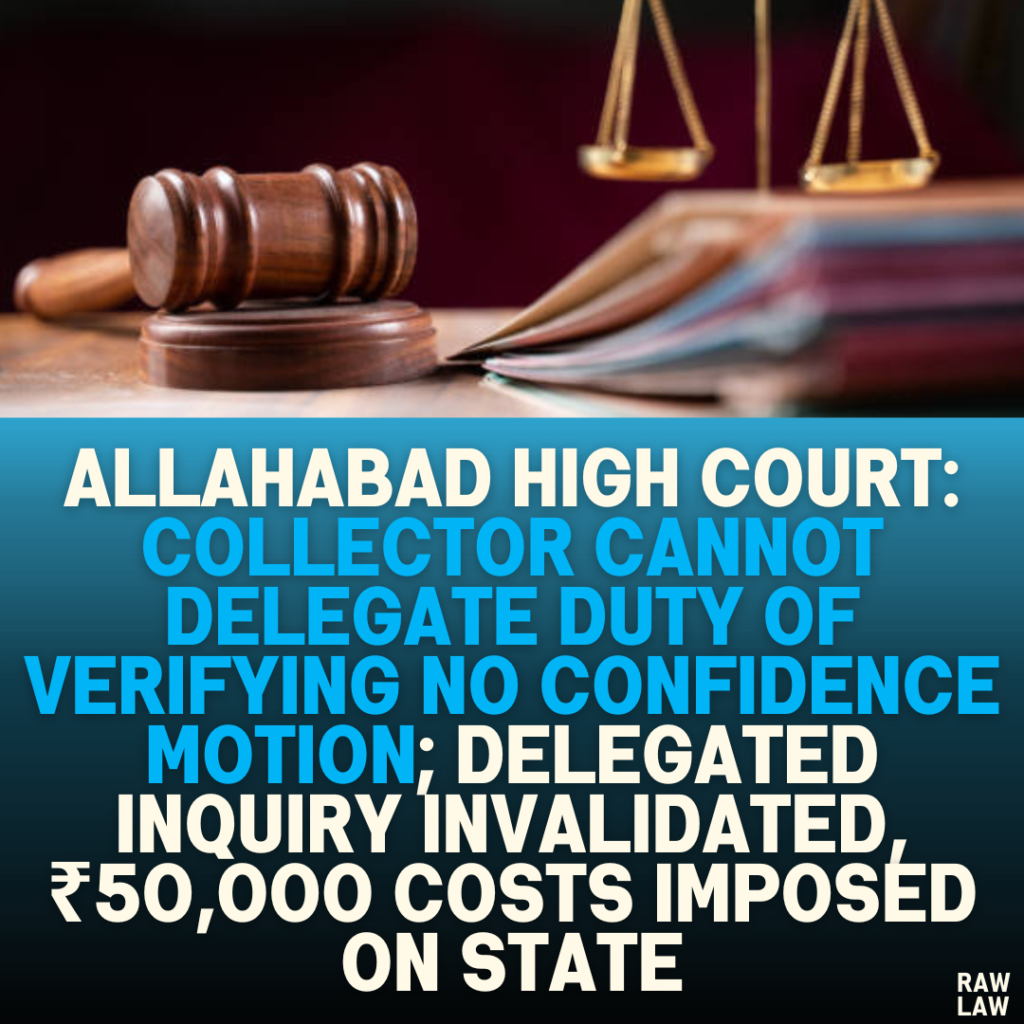Court’s Decision
The Allahabad High Court declared that the orders dated 21.08.2024 (passed by the District Panchayat Raj Officer) and 12.11.2024 (issued by the Collector) were invalid. It ruled that the Collector is statutorily obligated under Section 15 of the U.P. Kshettra Panchayat and Zila Panchayat Adhiniyam, 1961 to personally verify the validity of a no confidence motion. Delegation of this duty to an inquiry committee or any other official, including the District Panchayat Raj Officer, was held to be unlawful. Consequently:
- The inquiry report and the impugned orders were quashed.
- Costs of ₹50,000 were imposed on the State Government, recoverable from the concerned Collector.
- The Collector was directed to personally verify the validity of the motion and convene a meeting within 30 days if satisfied.
Facts
- Background of the Motion:
- Petitioners, elected members of the Kshettra Panchayat Dudhahi, submitted a no confidence motion against the Block Pramukh, claiming the support of 101 out of 139 elected members.
- The motion, filed on 12.08.2024, was accompanied by notarized affidavits.
- Allegations of Forgery:
- Subsequently, affidavits from 48 members surfaced, alleging that their signatures on the no confidence motion were forged.
- Collector’s Actions:
- The Collector constituted an inquiry committee comprising officials, including the District Panchayat Raj Officer, to investigate the allegations.
- Based on the committee’s report, which found only 53 signatures to be genuine, the District Panchayat Raj Officer rejected the motion on 21.08.2024.
- Collector’s Subsequent Order:
- During the pendency of the writ petition, the Collector passed an order on 12.11.2024 affirming the inquiry committee’s findings and dismissing the no confidence motion.
- Legal Challenge:
- Petitioners contended that the inquiry and subsequent orders were unlawful, as Section 15 of the Act mandates the Collector to personally verify the motion’s validity.
Issues
- Whether the writ petition was defective due to the Block Pramukh not being impleaded by name.
- Whether the Collector had the authority to delegate the verification process to an inquiry committee.
- Whether the District Panchayat Raj Officer had jurisdiction to reject the no confidence motion.
- Whether the Collector’s order dated 12.11.2024 was lawful.
Petitioner’s Arguments
- Improper Delegation: The Collector violated statutory provisions by delegating his responsibility to an inquiry committee.
- Prima Facie Requirements Met: The motion was signed by more than half the elected members, as required under Section 15 of the Act, and further inquiry was unwarranted.
- Jurisdictional Overreach: The District Panchayat Raj Officer lacked authority to reject the no confidence motion, which is exclusively within the purview of the Collector.
Respondent’s Arguments
- Forgery Concerns: The inquiry was necessary to address allegations of forged signatures, and the Collector acted within his discretion.
- Validity of Rejection: The District Panchayat Raj Officer’s rejection of the motion was based on the inquiry report and was lawful.
- Impleadment Issue: The writ petition was defective as the Block Pramukh was not named as a party.
Analysis of the Law
- Statutory Framework:
- Section 15 of the U.P. Kshettra Panchayat and Zila Panchayat Adhiniyam, 1961 outlines the process for submitting and verifying a no confidence motion.
- The provision mandates the Collector to:
- Verify whether the motion is signed by at least half of the elected members.
- Convene a meeting within 30 days for consideration of the motion.
- Role of the Collector:
- The Collector’s role is strictly non-delegable. Judicial precedents, such as Smt. Sheela Devi v. State of U.P., emphasize that the Collector must personally determine the validity of the motion without conducting a detailed evidentiary inquiry.
- Precedents:
- Smt. Sheela Devi v. State of U.P.: The Collector must act promptly and is not authorized to undertake or delegate a detailed evidentiary inquiry into the authenticity of signatures.
- Utma Devi v. State of U.P.: The Collector must verify prima facie compliance with the requirements and cannot act as a civil court.
Precedent Analysis
- Invalid Delegation:
- In Smt. Sheela Devi, the Full Bench of the Allahabad High Court ruled that the Collector cannot delegate his statutory responsibility or conduct an evidentiary inquiry into allegations of forgery, as these are outside his jurisdiction.
- Collector’s Role Defined:
- Utma Devi clarified that the Collector’s responsibility is to verify prima facie whether the motion meets statutory requirements without delving into the validity of signatures through elaborate inquiries.
Court’s Reasoning
- Impleadment Issue:
- The absence of the Block Pramukh as a named party was not fatal to the writ petition since her counsel appeared and argued the case, satisfying the principles of natural justice.
- Delegation Unlawful:
- The Collector’s delegation of verification duties to an inquiry committee was inconsistent with the statutory mandate under Section 15.
- District Panchayat Raj Officer’s Jurisdiction:
- The District Panchayat Raj Officer had no statutory authority to reject the motion, as this power lies solely with the Collector.
- Collector’s Inaction:
- The Collector’s reliance on the committee’s report and delay in addressing the motion constituted a failure to discharge his statutory duty.
Conclusion
The High Court quashed:
- The inquiry report dated 17.08.2024.
- The orders of the District Panchayat Raj Officer (21.08.2024) and the Collector (12.11.2024).
The court directed the Collector to:
- Personally verify the validity of the no confidence motion in accordance with Smt. Sheela Devi and Utma Devi.
- Convene a meeting within 30 days if the motion meets statutory requirements.
The State Government was ordered to pay costs of ₹50,000 to the petitioners, recoverable from the concerned Collector.
Implications
This judgment reinforces the principle that statutory responsibilities cannot be delegated unless expressly permitted by law. It emphasizes accountability in governance and underscores the need for adherence to procedural requirements under the U.P. Kshettra Panchayat and Zila Panchayat Adhiniyam, 1961.
